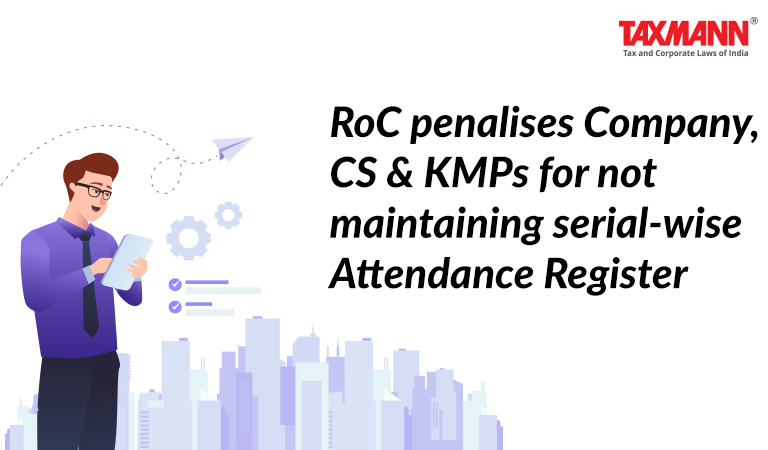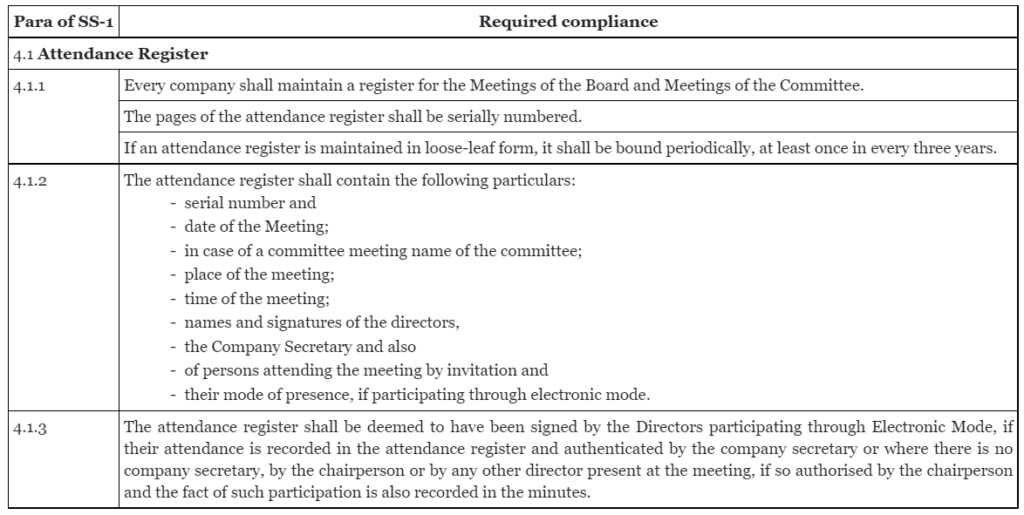RoC penalises Company, CS & KMPs for not maintaining serial-wise Attendance Register
- Blog|News|Company Law|
- 2 Min Read
- By Taxmann
- |
- Last Updated on 20 December, 2022

[2022] 145 taxmann.com 449 (Article)
1. Secretarial Standard
As per the explanation to sub-section(1) of section 205 of the Companies Act 2013, Secretarial Standards means the “Secretarial Standards” as issued by the Institute of Company Secretaries of India constituted under section 3 of the Company Secretaries Act, 1980 and approved by the Central Government. The secretarial standards provide clarity on the respective subjects and it does not mean that the secretarial standards are alternative to the original laws enacted by the Parliament. One could conclude by saying that wherever the law is not clear it requires an explicit spirit of the law, the secretarial standard provides clarity on the respective subjects to the user. As per the provisions of the Companies Act 2013, adherence by a company to the Secretarial Standard is mandatory.
2. Attendance Registers for meetings of the board, general meetings and meetings of the committee
The Secretarial Standard-1 issued by the Institute of Company Secretaries of India, spells out in its para 4 under the heading “Attendance at Meetings” which is required to be maintained by every company. The relevant provisions relating to the maintenance of the attendance register as per the Secretarial Standard are as given below:-

3. Relevant provisions relating to Secretarial Standard under the Companies Act 2013
Sub-section (10) of section 118 of the Companies Act 2013 provides that every company shall observe Secretarial Standards with respect of general and board meetings specified by the Institute of Company Secretaries of India constituted under section 3 of the Company Secretaries Act 1980 and approved as such by the Central Government.
4. Penal provision for default/violation
Sub-section (11) section 118 of the Companies Act 2013 provides inter alia that if any default is made in complying with the provisions of section 118 in respect of any meeting, the company shall be liable to a penalty of twenty-five thousand rupees and every officer of the company who is in default shall be liable to a penalty of five thousand rupees.
5. Consequences of any default
To understand the consequences of any default while complying with the Secretarial Standards-1 and 2 relating to the meetings of the board of directors (and other meetings) mandated by the Companies Act 2013, let us go through the decided case law by the Registrar of Companies, NCT of Delhi & Haryana on this matter on 30th November 2021.
Click Here To Read The Full Article
Disclaimer: The content/information published on the website is only for general information of the user and shall not be construed as legal advice. While the Taxmann has exercised reasonable efforts to ensure the veracity of information/content published, Taxmann shall be under no liability in any manner whatsoever for incorrect information, if any.

Taxmann Publications has a dedicated in-house Research & Editorial Team. This team consists of a team of Chartered Accountants, Company Secretaries, and Lawyers. This team works under the guidance and supervision of editor-in-chief Mr Rakesh Bhargava.
The Research and Editorial Team is responsible for developing reliable and accurate content for the readers. The team follows the six-sigma approach to achieve the benchmark of zero error in its publications and research platforms. The team ensures that the following publication guidelines are thoroughly followed while developing the content:
- The statutory material is obtained only from the authorized and reliable sources
- All the latest developments in the judicial and legislative fields are covered
- Prepare the analytical write-ups on current, controversial, and important issues to help the readers to understand the concept and its implications
- Every content published by Taxmann is complete, accurate and lucid
- All evidence-based statements are supported with proper reference to Section, Circular No., Notification No. or citations
- The golden rules of grammar, style and consistency are thoroughly followed
- Font and size that’s easy to read and remain consistent across all imprint and digital publications are applied



 CA | CS | CMA
CA | CS | CMA
